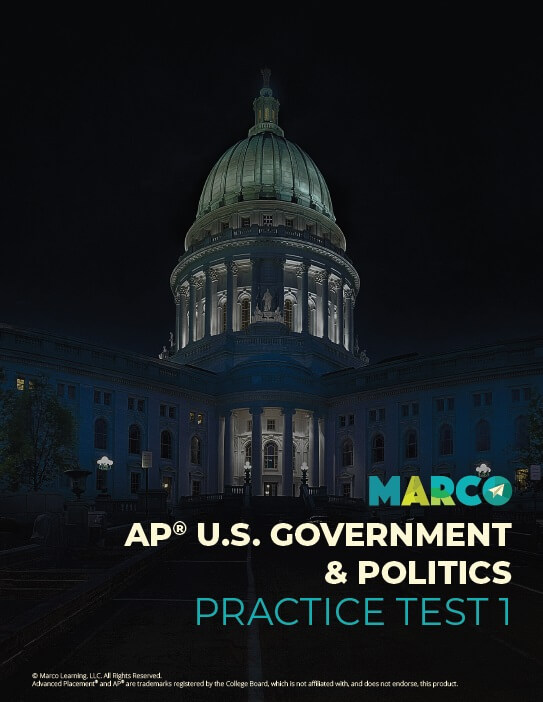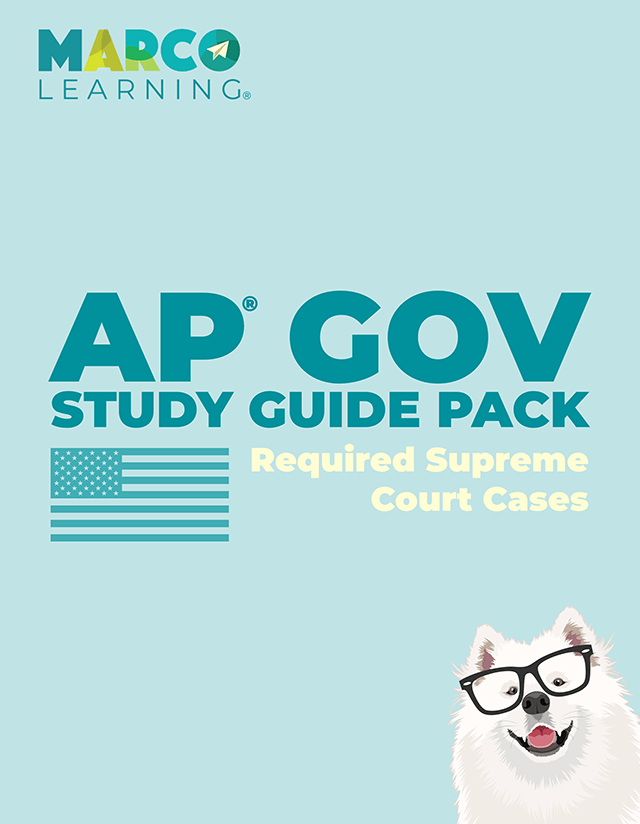


To score well on your AP® U.S. Government and Politics Exam, it is important to become familiar with all of the required Supreme Court cases. In the free-response section of your AP U.S. Government Exam, you will have to answer four essay questions. The third of these questions is a SCOTUS comparison essay, in which you will be required to compare a non-required Supreme Court case with a required Supreme Court case, so get to know each required Supreme Court case as well as possible!
The required Supreme Court cases for the AP U.S. Government and Politics Exam in 2021 are:
Marbury v. Madison (1803)
McCulloch v. Maryland (1819)
Schenck v. the United States (1919)
Brown v. Board of Education (1954)
Engel v. Vitale (1962)
Baker v. Carr (1962)
Gideon v. Wainwright (1963)
Tinker v. Des Moines Independent Community School District (1969)
New York Times Co. v. United States (1971)
Wisconsin v. Yoder (1972)
Roe v. Wade (1973)
Shaw v. Reno (1993)
United States v. Lopez (1995)
McDonald v. Chicago (2010)
Citizens United v. Federal Election Commission (2010)
Engel v. Vitale (1962)
Engel v. Vitale is one of the required Supreme Court cases for AP U.S. Government and Politics. This case resulted in the landmark decision that established that it was unconstitutional for public schools to lead students in prayer.
FACTS OF THE CASE
The state of New York passed legislation requiring public school teachers to start the school day by leading the classroom in the Pledge of Allegiance and a short, nondenominational prayer to “Almighty God” that was composed by the state legislature. Students who objected to the prayer or who did not want to participate were not forced to do so. A group of families led by Steven Engel sued the School Board President, William J. Vitale, arguing that the prayer violated their religious beliefs. The families came from a variety of different religious backgrounds. They argued that even a nondenominational prayer violated the Establishment Clause of the First Amendment. The New York Court of Appeals upheld the right of the state of New York to encourage prayer in the classroom. When the decision was appealed to the Supreme Court, the governments of twenty-two states sent amicus curiae briefs in support of prayer in public schools.
THE DECISION
In a 6-1 decision, the Court ruled that public schools could not promote prayer because the promotion of religion was considered a violation of the Establishment Clause. The ruling set a precedent for the interpretation of the Establishment Clause that differed from previous rulings because coercion was not required to show a violation of the First Amendment.
IMPACT
The ruling in Engel v. Vitale established a precedent that was used to significantly limit government-directed prayer in public school systems through several subsequent landmark Supreme Court decisions. Since the 1960s, the ruling was used to determine that silent prayer, clergy-led prayers at graduation ceremonies, and student-led prayer at public school events all violate the First Amendment.
PRECEDENT
West Virginia State Board of Education v. Barnette (1943)— argued that students could not be punished for refusing to salute the American flag because doing so was an expression of free speech under the First Amendment.
SUBSEQUENT CASE
Santa Fe Independent School District v. Doe (2000)—The issue of school prayer continues to be controversial. In 2000, the Supreme Court ruled that student-led, student-initiated prayer on public school property using a school loudspeaker system violated the Establishment Clause of the First Amendment.
KEY TERMS
Amicus Curiae Brief Supreme Court cases are often supplemented by amicus curiae briefs (literally “friend of the court” briefs) filed by people or groups not directly involved in the case that lay the broader implications of the ruling.
Establishment Clause The Establishment Clause of the First Amendment states that “Congress shall make no law respecting an establishment of the religion.” Judicial interpretations of the clause have ranged from broad interpretations that say the clause prevents any state support of religion to narrow interpretations that argue that the clause only prohibits the development of a state-sponsored church.
First Amendment to the U.S. Constitution “Congress shall make no law respecting an establishment of religion, or prohibiting the free exercise thereof; or abridging the freedom of speech, or of the press; or the right of the people peaceably to assemble, and to petition the Government for a redress of grievances.”
The best way to get better at something is by practicing.
That’s why it’s so important that you take practice tests to help you get better at the AP U.S. Government and Politics Exam. Only then can you expect to get a good score—and even improve your score.
 Help
Help